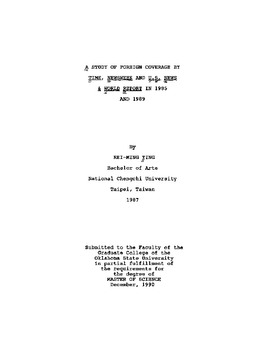| dc.contributor.author | Ting, Rei-Ming | |
| dc.date.accessioned | 2014-12-17T20:26:55Z | |
| dc.date.available | 2014-12-17T20:26:55Z | |
| dc.date.issued | 1990-12-01 | |
| dc.identifier.uri | https://hdl.handle.net/11244/14022 | |
| dc.description.abstract | Why are there rigid stereotypes of foreign nations among people of the United States? Why in 1990 do some people in the United States still think that Taiwan is a police state? And when the United States invaded Grenada and when Iraq invaded Kuwait, how many people in the United States knew the background of the two invaded nations and understood why instabilities in a remote region such as the Middle East or in a small nation such as Grenada could trigger military movements of their nation? In a global community, where people pay a price for changes and instabilities happening far away from their nations, are news media providing a representative picture of the community to audiences? These were the questions which this study intended to answer. | |
| dc.format | application/pdf | |
| dc.language | en_US | |
| dc.publisher | Oklahoma State University | |
| dc.rights | Copyright is held by the author who has granted the Oklahoma State University Library the non-exclusive right to share this material in its institutional repository. Contact Digital Library Services at lib-dls@okstate.edu or 405-744-9161 for the permission policy on the use, reproduction or distribution of this material. | |
| dc.title | Study of Foreign Coverage by Time, Newsweek and U.S. News & World Report in 1985 and 1989� | |
| dc.type | text | |
| osu.filename | Thesis-1990-T588s.pdf | |
| osu.accesstype | Open Access | |
| dc.description.department | Mass Communications | |
| dc.type.genre | Thesis | |
